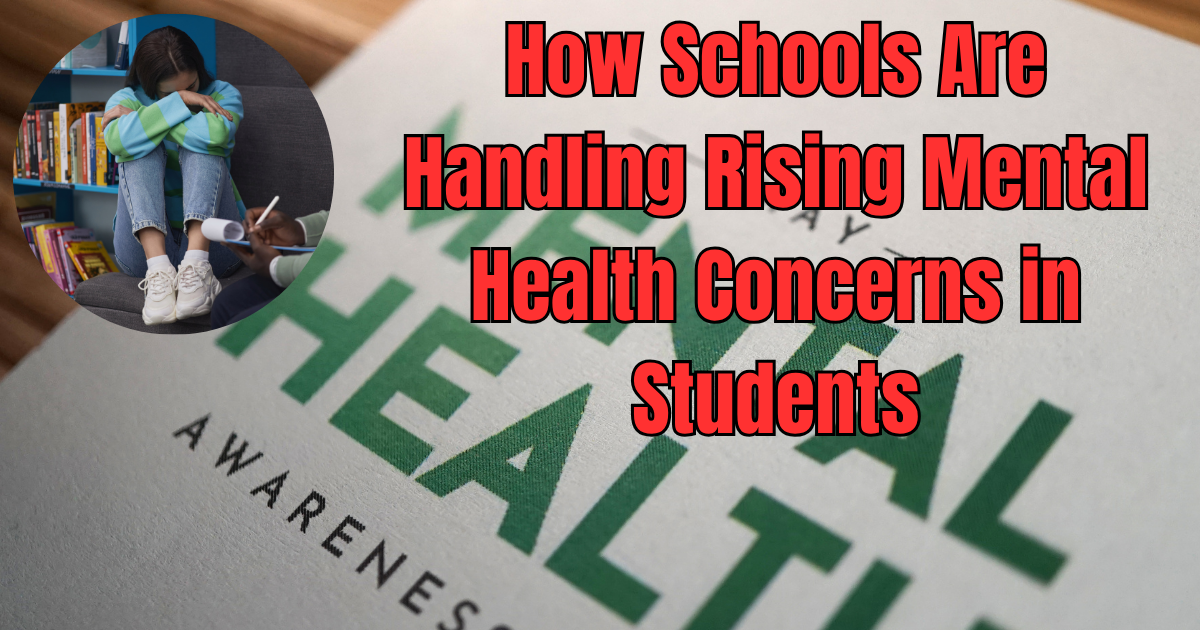How Schools Are Handling Rising Mental Health Concerns in Students: Mental health is an integral part of overall well-being, yet it is often overlooked in the context of education. As more and more students struggle with mental health issues, the role of schools in providing support becomes increasingly clear.
How Schools Are Handling Rising Mental Health Concerns in Students
Mental health has become a significant concern in India, particularly among the younger generation. The increasing pressure to succeed, societal expectations, and the lack of awareness and resources have led to a rise in mental health problems.

Mental health is an integral part of overall well-being, yet it is often overlooked in the context of education. Mental health issues can hinder a student’s ability to concentrate, retain information, and engage in academic activities, leading to poor academic performance and decreased school attendance.
Mental Health Awareness in Schools
Raising mental health awareness is an important first step in addressing the issue. By normalizing conversations about mental health, schools can create a more supportive environment where students feel comfortable seeking help.
- Implementing mental Health education in schools
Integrating mental health education into the school curriculum can help students understand the importance of mental well-being, recognize the signs and symptoms of mental health issues, and learn coping strategies early on.
- Training staff to recognize and respond to signs of distress
Teachers and school staff of the school are often the first to notice changes in a student’s behavior that may indicate mental health concerns. Providing them with training on how to recognize these signs and how to respond appropriately can help ensure that students receive timely support.
How Can Schools Help With Mental Health Health: practical Strategies
1. Promoting a positive school culture
Fostering a positive, inclusive, and supportive school culture can significantly impact students’ mental health. Encouraging kindness, celebrating diversity, and addressing bullying are all part of creating a positive school environment.
2. Encouraging parental involvement
Parents play a crucial role in their children’s mental health. Schools can facilitate workshops and provide resources to help parents understand mental health issues and support their children effectively.
3. Implementing Stress-reduction programs
Programs such as mindfulness training, yoga, and relaxation techniques can be introduced to help students manage stress. These can be incorporated into the school day or offered as extracurricular activities.
Challenges in Addressing mental health in school
- Lack of awareness
There is a lack of awareness and education about mental health. Many people do not understand the different types of mental illnesses, their symptoms, and the available treatments.
- Limited resources:
There is a significant shortage of mental health professionals, particularly in rural areas. This shortage makes it difficult for schools to provide mental health services to their students. Additionally, mental health services are not always covered by health insurance, making it challenging for families to access these services.
- Academic pressure:
Indian schools are known for their rigorous academic curriculum and high-pressure environment. Students are expected to excel in academics, which can lead to stress, anxiety, and depression.
Solution for addressing mental health in schools
- Mental health education
Mental health education should be integrated into the school curriculum to increase awareness and reduce stigma. Students should be taught about different mental illnesses, their symptoms, and available treatments.
- Mental health service:
Schools should provide mental health services to their students, including counseling and therapy. Mental health professionals should be trained to work with the students and understand the unique challenges they face.
- Supportive school environment: Schools create a supportive environment that promotes good mental health. This includes creating a positive school culture, providing resources for stress management, and encouraging open communication between students and teachers.
- Parental involvement: Parents play an essential role in promoting good mental health in their children. Schools should engage parents in discussions about mental health and encourage them to seek help if they notice any signs of mental illness in their children.
Conclusion
In this article we discussed how schools are handling rising mental health concerns in students: Mental health is an integral part of overall well-being. Schools can take steps to increase awareness, provide mental health services, create a supportive environment, and involve parents in promoting good mental health. Mental health has become a significant concern in India, particularly among the younger generation.

Mark Delyn focuses on education, learning methods, and academic trends. Her work supports students, educators, and lifelong learners with practical and timely insights.








